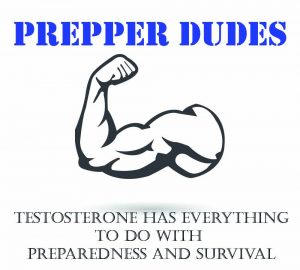
ReadyNutrition Readers, I once did a piece a while back on firearms for the ladies, and in that light, it’s time to do one that pertains to the guys. This one is on the importance of testosterone, a substance that is very important in areas besides procreation and family life. Testosterone is a “building block” upon which many complex bodily functions in men is dependent. It is also the key regarding weightlifting and physical training.
Firstly, I highly recommend picking up the following book, one that I have mentioned in other articles regarding physical training. Entitled, “The Testosterone Advantage Plan,” this book is really the end-all, be-all in terms of weight training for men. It has a ton of information besides the subject of testosterone from the glycemic index and charts to the workings of fatty acid glycolysis. We’re sticking to the subject of testosterone in this article.
Testosterone is produced by cholesterol, a precursor hormone, and relies on fat to form. Fat comes in several forms which we have outlined in previous articles on Ready Nutrition. Testosterone is an androgen, a hormone produced in the bodies of males. Some functions (in addition to sexual and reproductive tasks) are bone density, increase in oxygen-carrying capacity, musculature, and the mobilization of fat for energy.
The higher the levels of testosterone in the male body, the less prone a man is to muscular fatigue when exercising and lifting weights. Testosterone also ensures better neuromuscular efficiency, and enables a tougher workout for more of a duration. There is also an inverse relationship between testosterone and cardiac risk: higher levels of testosterone lower your risk of heart disease. This is because testosterone has a dilating effect on the coronary arteries. These arteries are the ones that supply the heart with blood. The relaxing effect enables a blood flow increase of up to 17%.
The optimal level of testosterone (standard) is 800 ng (nanograms)/dl (deciliter) in the blood; this ratio will need the assistance of the doctor and a laboratory to discover. Now, returning to cholesterol, the normal amount the body needs is equivalent to 300 mg per day. We have approximately 0.2% in our body weight. It is a precursor to hormones such as testosterone and the adrenal corticoids. Too much of it in the body can cause problems; however, it is (for the most part) not a problem except for those with sedentary lifestyles or with existing heart problems or conditions.
Stress can lower testosterone levels. This stress is both physical stress, such as working out too much or too long, and emotional stress, such as caused by daily stressors at work, at home, and as a man ages. One of the problems with stress of either kind is the production of cortisol, a hormone released when stress occurs. Cortisol is the biggest “enemy” of testosterone production, as it promotes the storage of fat in the body (the “fuel” that makes testosterone and also keeps you slim when testosterone “burns” it off). Cortisol also sends the body an “instruction” to burn off muscle tissue for energy in the form of protein, a form of “cannibalism” detailed in previous articles.
The amount of cortisol released under normal conditions can be prevented from being counterproductive to testosterone levels with a well-managed, well-crafted program of weightlifting. Such will suppress the release of cortisol. Testosterone functions during the anabolic (building) phase of exercise, and cortisol functions during the catabolic phase, which is where the muscles that are broken down need to be prevented from being so depleted that they turn themselves into energy (cannibalism). Right after working out, you need to take in protein and carbohydrates within 30 minutes of exercise completion or sooner…and the sooner the better.
You can stick to all-natural ways to boost your level of testosterone. There is an article that lists 16 different foods that all directly or indirectly (the latter meaning affects the body in a way to stimulate its efficiency) boost testosterone levels. The article can be found at www.anabolicmen.com/foods-that-boost-testosterone-naturally. The details can be taken from the other article; however, I’m going to list the foods here to give you a good start to supplement the research in the article with your own. Here are the 16 foods, in the order they appear: Potatoes, Macadamia nuts, coffee, Brazil nuts, Extra-virgin olive oil, parsley, ginger, raw cacao/cocoa, eggs, baking soda, probiotics, grass-fed beef, grass-fed butter, coconut oil, garlic with vitamin C in combination, and onions.
By utilizing testosterone as produced within your body, you can generate gains for yourself in your physical training. Some may ask, “What does this have to do with survival and preparedness?” It has everything to do with it. In order to perform your best under a stressful situation, such as beating the daylights out of a marauder in hand-to-hand combat, or lifting a heavy object pinning down a family member…you have to be at your best to do it. Guys, your greatest weapons are your mind, and a body that you work on each day to train to maximum potential. This is part of it: a part of who and what you are. Testosterone is a tool within yourself that can help you meet your goals if you develop it and use it to its potential. JJ out!

“higher levels of testosterone lower your risk of heart disease”
That might be true for a regular man but studies show eunuchs live much longer depending on the age of castration. However they’re pretty similar to women if fixed early in life and not very strong. Also having a high voice.
Eunuchs fixed well after puberty lose attraction to most women, especially female body parts asociated with male libido (b & v).
However with modern foods there’s a high risk of osteoporosis so this isn’t like ancient times anymore.